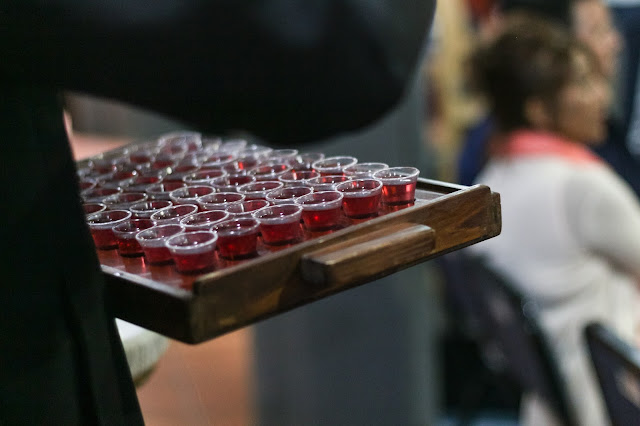Question 96: What is the Lord's Supper?The Lord’s Supper was instituted by the Lord Jesus on the night when he was betrayed, to be observed by his church until he comes again. In this supper, his sacrifice of himself is not repeated or offered again to God (Heb. 10:14), but his death is showed forth and proclaimed to us (1 Cor. 11:26). Christ crucified is portrayed and presented to believers in the gospel and in the sacrament, the bread and wine being symbols of his body and blood. We partake of the Lord's Supper in remembrance of the Lord Jesus and his once-for-all sacrifice of himself on the cross. And we do not merely remember that he died, but that he died for us. For this supper is a sign and seal of his promise to believers that this body and blood was given for them and the remission of their sins (Matt. 26:28). This sacrament is a seal of the covenant of grace in the way that people shake hands to confirm a deal. The physical act confirms the words spoken.
Answer: The Lord's Supper is a sacrament, wherein, by giving and receiving bread and wine, according to Christ's appointment, his death is showed forth; and the worthy receivers are, not after a corporal and carnal manner, but by faith, made partakers of his body and blood, with all his benefits, to their spiritual nourishment, and growth in grace. (WSC)
As we respond to this sign and seal with faith, it works as a means of grace by which Christ feeds us with himself. In this supper, he invites us to take and eat and drink of his body and blood. The apostle Paul calls this bread and wine a communion (or “participation”) in the body and blood of Christ (1 Cor. 10:16). It is akin, he says, to the sacrificial meals of the Old Testament, in which those who ate of the sacrifice were participants in the sacrifice (1 Cor. 10:18). The sacrifice on the cross happened long ago, but we continue to feed on it and draw strength from it today. As 1 Corinthians 5:7 says, “Christ, our Passover lamb, has been sacrificed.” The lamb was slain long ago. Yet 1 Corinthians 5:8 goes on to exhort believers: “Therefore let us keep the feast.” We continue to feed on the Lamb that was slain, participating in the benefits of his death. And in our case the Lamb is risen and alive and we abide in him (John 6:56), like branches in a vine (John 15:1-7). This sacrament is one means by which he gives himself to us, bringing us life from heaven.
While we do feed on Christ in this supper, we do not do so with our teeth and stomach. Jesus did not say that the bread and wine become his body and blood, or that his body and blood is inclosed in the bread and wine. His body remains a human body even when glorified, visible and limited to one place. His body is in heaven. Nevertheless, Christ’s words of institution do indicate that his body and blood is truly offered to believers in this supper. Those who outwardly partake of the visible elements in a worthy manner do inwardly by faith receive and feed upon Christ’s body and blood, receiving life and strength from him. This is done by the Spirit, who makes us living members of Christ’s body and conveys to us all the benefits of his death (1 Cor. 12:12-13, John 6:63).

No comments:
Post a Comment